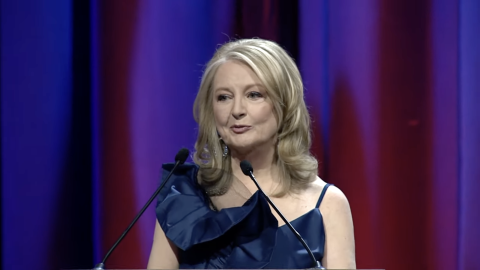During the Cold War, Natan Sharansky, a Jewish Refusnik in the Soviet gulag, tapped on his prison cell in Morse code, excited to tell other prisoners the news: President Reagan had called the Soviet Union an “evil empire.” Sharansky was elated, he later explained, because the leader of the Free World made a frankly moral judgment, delegitimizing their oppressors.
Sharansky and other prisoners of conscience were freed thanks largely to relentless American advocacy. Reagan said he viewed religious freedom as the Soviets “Achilles’ heel.” Eventually, the empire fell, without a shot fired, due to Reagan’s policy of peace through military and economic strength, and public diplomacy that especially focused on religious freedom and that, yes, delegitimized Soviet communism before the world.
The United States has been the world’s indispensable nation in the defense of religious freedom.
This is rooted in America’s dedication to the right, at home. The United States recognizes certain “unalienable rights” endowed by our Creator, of which religious freedom is the very first guaranteed in the Constitution’s Bill of Rights. It has been central to our history, traditions, and laws. Think of President George Washington’s unequivocal promise to a Rhode Island synagogue, in 1790: the United States “gives to bigotry no sanction, to persecution no assistance.” These are revolutionary words still. Many countries today persecute their religious minorities.
Our First Amendment’s focus on limiting government power is part of American exceptionalism. It bars laws establishing religion and prohibiting its “free exercise.” Thus, unlike many places, the US does not license religions nor pick and choose among denominations.
Religious freedom in America is not limited to worship or holding beliefs in the secrecy of one’s heart -- even North Korea has that. It includes manifesting religion in public. Religious charities run hospitals, schools, and much else; thirty percent of American charitable giving goes to religious organizations.
Religious freedom also includes the rights to convert, criticize and reject religion. We have the right to educate our children in our faith and morals. Religious objections to other governmental priorities can be accommodated, as seen in recent Supreme Court decisions for Catholic nuns and Sikh soldiers.
Let me cite some examples from abroad showing why America is seen as the shining city on a hill:
- If you’re caught praying in North Korea, three generations of your family can be sent to labor camp. If caught with a Bible, you’ll be executed.
- In Iran, all women must wear Muslim headscarves in public under penalty of imprisonment or death. In January, Iran sent hit men to Brooklyn to murder Masih Alinajad, a prominent critic of Iran’s hijab law. The FBI thwarted them.
- In Nigeria, extremists have reportedly slaughtered over 5,000 Christians last year alone and attacked some 18,000 churches since 2009 -- largely with impunity.
Severe persecutors don’t share our fundamental values and aren’t reliable allies. Secretary of State Pompeo designated China’s persecution of Uyghur Muslims as genocide and it opened the West’s eyes to the mortal threat the Chinese Communist Party poses to our values and security.
China is the modern face of persecution and the greatest threat to religious freedom today.
It uses a dense web of regulations and sophisticated tactics. All religious groups are suspect and must register with the party, which controls houses of worship with high tech surveillance cameras that feed into digitized social credit score systems and police computers.
A million Muslims have been recently detained in reeducation camps, where women are forcibly sterilized. Falun Gong is officially targeted for “elimination “and its practitioners are evidently killed to order, for organ transplants. This spring, the FBI arrested two Chinese agents who brazenly opened a police station in Manhattan to persecute Falun Gong here, according to the indictment.
It is illegal in China to expose children to religion. Christian leaders must preach the
teachings of President Xi Jinping. Eight Vatican-approved Catholic bishops are in black jails -
- that is, detained indefinitely without due process and subjected to re-education and Maoist struggle sessions that Bradley prize winner Chen Guangcheng suffered. Two Chinese
Americans are among the Protestant pastors serving long sentences in prisons. In Hong Kong, Cardinal Zen and free speech hero Jimmy Lai face possible life imprisonment.
The innate search for truth and meaning impels religious followers, despite the risks, to resist a system based on lies. Their communities are among the last remnants of civil society, as Beijing’s control tightens. They need US advocacy and this would serve our national security interests. But American commitment to religious freedom is eroding.
The Supreme Court annually considers challenges to religious freedom, typically involving accommodation and wall of separation issues. And, we are seeing a different kind of threat surface. First Amendment freedoms are being subordinated to new cultural preferences that lack national consensus.
Private hate speech bans curb religious freedom, as well as free speech. Even law schools are canceling traditional religious beliefs, as “fascist.” Will we be following Europe? Finland is criminally prosecuting a Christian parliamentarian for tweeting a screen shot of the Bible.
Here, a red flag appeared, when an FBI office labeled Catholic Latin Mass supporters as
suspected security threats and called for infiltrating their congregations. Though no crime was cited, FBI legal counsel approved this -- so would the Chinese Communist Party. This call was retracted after it leaked.
And, there are bigoted attacks against traditional religions that occur with virtual impunity.
Since 2020, hundreds of pro-life centers and churches have been firebombed and
vandalized, with only a small fraction prosecuted, as the Attorney General acknowledged at a recent senate hearing.
Prosecutions have also been scarce in Brooklyn where Orthodox Jews in religious garb are regularly assaulted in their neighborhoods. This evokes some of modern history’s worst persecutors. It occurs as anti-Semitism surges, with unprecedented, deadly synagogue shootings.
We can no longer afford to take our own religious freedom for granted. The horrors of
persecution abroad remind us why we must defend this unalienable right at home.















